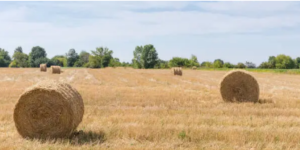The twine you choose for your baling operation must be tough enough to last. Look for a strong twine with heavy coils that prevent damage. Also, check the guaranteed number of feet per carton.
Venus Red Force + is a tried and true twine that performs well in all balers. It has a high 290kg knot strength and is made for Australian baling conditions, including UV resistance. For more high-strength baler twine, check this out.
Durability
 Your twine must stand up to the elements when you’re baling hay or straw. It must withstand the rain, snow, and extreme temperatures affecting your bales. Additionally, it should be strong enough to hold a knot well and last for a long time.
Your twine must stand up to the elements when you’re baling hay or straw. It must withstand the rain, snow, and extreme temperatures affecting your bales. Additionally, it should be strong enough to hold a knot well and last for a long time.
UniPak carries a range of high-quality baling twines that are perfect for modern machines. We’ve got you covered, from a standard big square twine with a 130 lb tensile strength to an ultra-high-density twine that will withstand the most challenging conditions.
When comparing twine, you should look for the tensile strength (in pounds), which indicates how suitable it will be for your machine. You should also consider the’ natural’ running of the twine – for example, ‘Type 130’ implies that you get 130m for every kilogram of twine, but this may not be true. In reality, it could be 115m per kg.
Strength
Strong twine is essential to a successful farm, whether mending fences, attaching tractor parts, or baling hay. High-strength baler twine is available in natural fibre and synthetic plastic. You can also choose from different colours and weights. The strongest twine is measured by tensile strength, which is the force an unbroken twine can hold before it breaks. For more high-strength baler twine, check this out.
This square baler poly twine has a 130-lb tensile strength and works with all large square balers. It’s made of polypropylene, resists mildew rot and has UV light inhibitors. It’s also consistent and knots easily without becoming brittle or attracting rodents.
The Hercules HD+ is 14% longer than standard Hercules twine, which allows you to make more bales and save money on freight costs. It also has a higher tensile strength and a stronger, more durable knot. It also has a unique ‘ultra-grip’ technology that helps prevent knot slippage.
Ease of handling
In baling conditions where the weather can be unpredictable, the reliability of your round or square baler twine is crucial. That’s why New Holland Agriculture developed the Pro-Belt Series to meet the high demands of farmers and contractors who clock up a lot of annual use of their balers.
The ‘tensile’ strength of twine refers to the force in kilograms of Force (Kgf) at which a twine will break. It is different from the ‘knot strength’ of the twine, which refers to the retained twine strength when a knot is made.
Eco-friendliness
For many years, sisal twine was the preferred choice for baling hay. However, farmers are now moving towards synthetic baler twine. It is a natural, biodegradable material that is also insect-resistant and can be used in various environments. It can also be recycled, which is good news for the environment.
The type of baler twine you use will impact the quality and durability of your hay bales. It is essential to know the twine’s tensile strength and knot strength before purchasing. These values indicate how much weight a twine can support and how well it will hold up to tying, hauling, and storing.
Reyenvas produces a variety of polypropylene twines for use in different baling conditions. The company’s standard twine product, Torfil, suits all baling machines and offers efficiency and consistency. It is also based on specific raw materials, including recycled resins, which help reduce waste and save energy. It is available in multiple colours and is highly resistant to UV degradation.
Whether you’re baling hay, straw or silage, there is a high-strength twine made for the job. Some are made from natural, biodegradable fibres, and some are polypropylene (poly). Both have their benefits, depending on the use and conditions under which they will be under pressure.